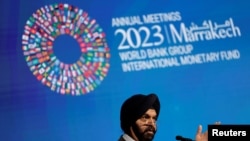Growth in the region is expected to fall to 3.3% this year from 4% last year, before rebounding to 4% in 2024, the IMF said in its World Economic Outlook report.
That is slightly lower than the IMF predicted in July, when it said Sub-Saharan Africa would grow 3.5% in 2023 and 4.1% next year. Non-commodity exporters are set to expand 5.6% this year, more than twice as fast as resource-dependent countries.
Russia's invasion of Ukraine, after COVID-19 had alreadydealt the global economy a heavy blow, sent food, fuel and fertiliser prices soaring in Africa last year. Weakening currencies, higher debt service costs and restricted access to capital markets added to debt pressures.
"We have had economies on two tracks," Abebe Selassie, director of the IMF's African Department, said in an interview with Reuters during the fund's annual meetings in Marrakech, Morocco.
"As countries like Nigeria address the huge imbalances that they're facing, what we'll hopefully see is... an acceleration of growth."
The 2023 growth forecast for oil producer Angola was slashed from an April projection of 3.5% to 1.3%, while Nigeria's was trimmed from 3.2% to 2.9%. South Africa, whose economy is hobbled by record power cuts, will grow just 0.9% this year.
"South Africa... should be rebounding and expanding even more, to make up for the ground that was lost in the pandemic," Selassie said.
"Growth... (is) nowhere near enough to make a dent in the employment challenge that the country has." Kenya's growth will accelerate 5% this year, the IMF said, up from 4.8% in 2022, despite its government cutting budgets amid soaring debt costs. Tanzania and Senegal are also set to see higher growth this year.
Annual inflation across the region, which has seen violent protests against the cost of living in countries including Ghana and Kenya, is expected to be 16.2% at the end of this year.
That would be the same as 12 months earlier, the IMF said, before it falls to 10.5% at the end of next year. Meanwhile the region's debt levels are stabilising at about 60%, and are expected to start falling slowly next year.



Forum